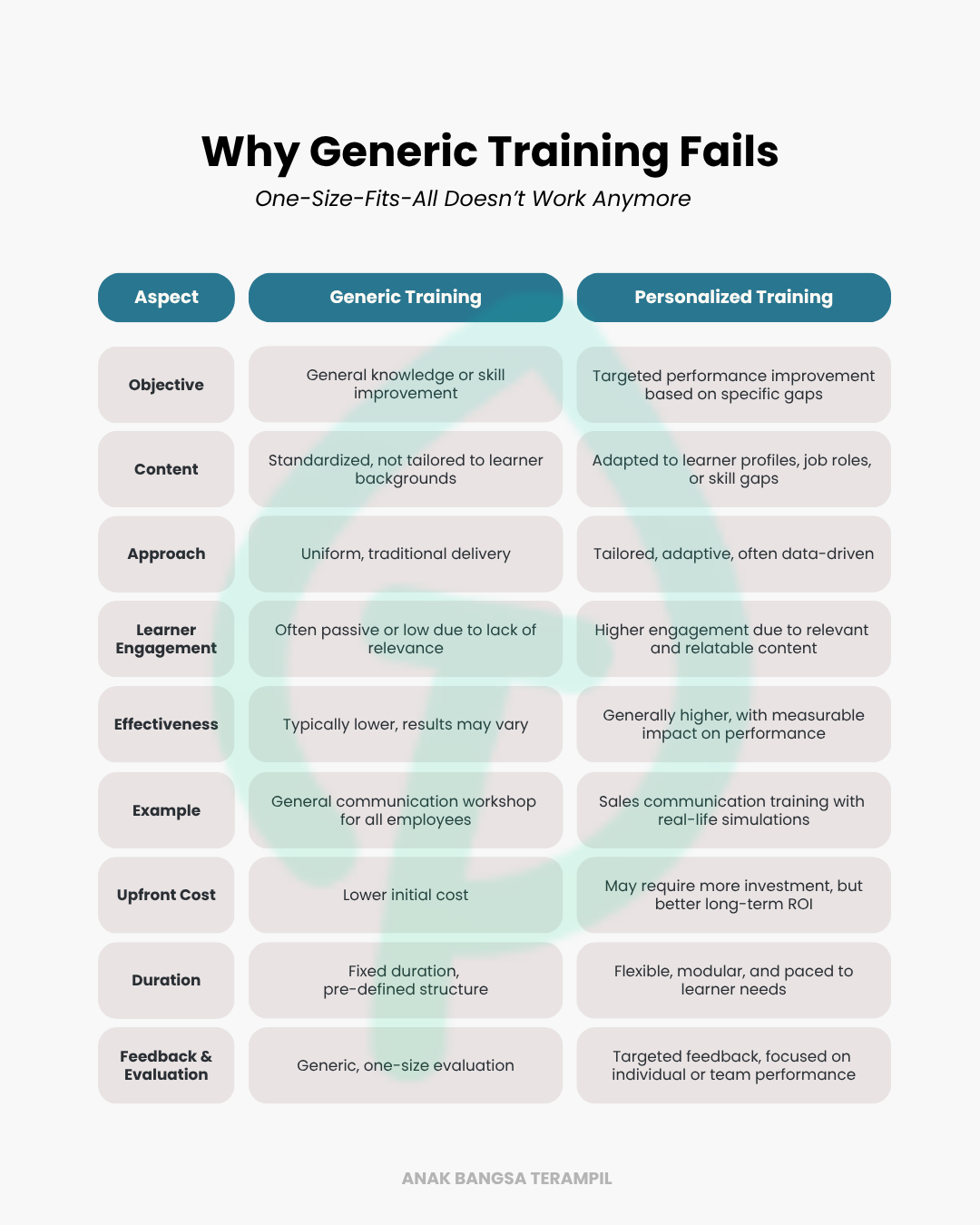The Hidden Cost of Generic Training
Companies spend millions annually on employee training. But what if most of it goes to waste?
According to the Harvard Business Review, nearly 75% of training programs fail to deliver lasting results. Why? Because they don't connect. They're generic, one-size-fits-all modules that ignore individual job roles, industry context, or even the learner’s preferred style.
Imagine a sales rep forced to sit through a compliance module for legal teams. Or a new hire watching leadership content meant for executives. It’s not just irrelevant—it’s demotivating.
When training doesn’t connect, employees disengage and don’t apply what they’ve learned. What they need is learning that’s personal, practical, and timely.
So, let’s unpack why personalized corporate training is no longer a luxury—but a necessity.
Why Generic Training Fails Modern Learners
One-Size-Fits-All Doesn’t Work Anymore
In a multi-generational, hybrid workforce, learning needs are more diverse than ever. Yet many organizations still rely on templated slide decks or outdated modules that treat every learner the same.
This approach might save time upfront, but in reality, it delays progress. It overlooks critical factors such as the employee's job function, their current skill level, and the real challenges they face in their daily workflow.
The comparison below highlights the fundamental flaws of generic training—and why personalization matters more than ever:

The Engagement & Application Gap
When training content feels disconnected, engagement plummets. But the issue doesn’t stop there.
Forbes Insights found that 58% of executives believe current training programs do not adequately prepare employees for future challenges.
Why? Because learning isn’t tied to actual performance needs.
Why Personalized Learning Is the Future of Corporate Training
What Personalized Corporate Training Looks Like
Personalized learning means creating content that reflects real job responsibilities, is contextualized to fit the company's industry and culture, and is delivered in formats that suit each learner—such as on-demand videos, interactive modules, or microlearning sessions.
Instead of overwhelming employees with irrelevant theory, we deliver custom learning content that fits real-world needs.
Real Business Benefits of Learning Personalization
High-performing companies have caught on. According to Harvard Business Review: "Organizations that align learning with role-specific KPIs see a 30% higher learning ROI."
With a personalized approach, you also:
- Boost learner engagement and retention
- Drive performance improvements tied to business outcomes
- Create a culture of continuous, self-directed learning
How ABT Learning Brings It All Together
At ABT Learning, we don’t just talk about personalization—we design for it.
Here’s how our Enterprise Learning Suite helps you implement impactful, personalized learning at scale:
- Custom Learning Videos: Built around your industry, roles, and workflows
- On-Demand Access: Across devices, supporting mobile learning anytime, anywhere
- SME Collaboration: We partner with internal or external experts to localize and contextualize content
- Learning Experience Design: Practical exercises, real case studies, branched scenarios
- Role-Based Learning Paths: Derived from training needs analysis (TNA) per employee or team
We help transform learning from a tick-box activity to a strategic business tool.
Final Thought: Stop Training That No One Uses
Personalized corporate training is no longer optional—it’s expected. Employees want relevance. Organizations need impact.
If your team is still stuck with outdated, one-size-fits-all content, it’s time to rethink your approach.
Start by asking:
- Is our training aligned with what employees actually do?
- Can our people access learning when and how they need it?
- Are we measuring learning outcomes in business terms?
If the answer is "not really", ABT Learning is here to help.

